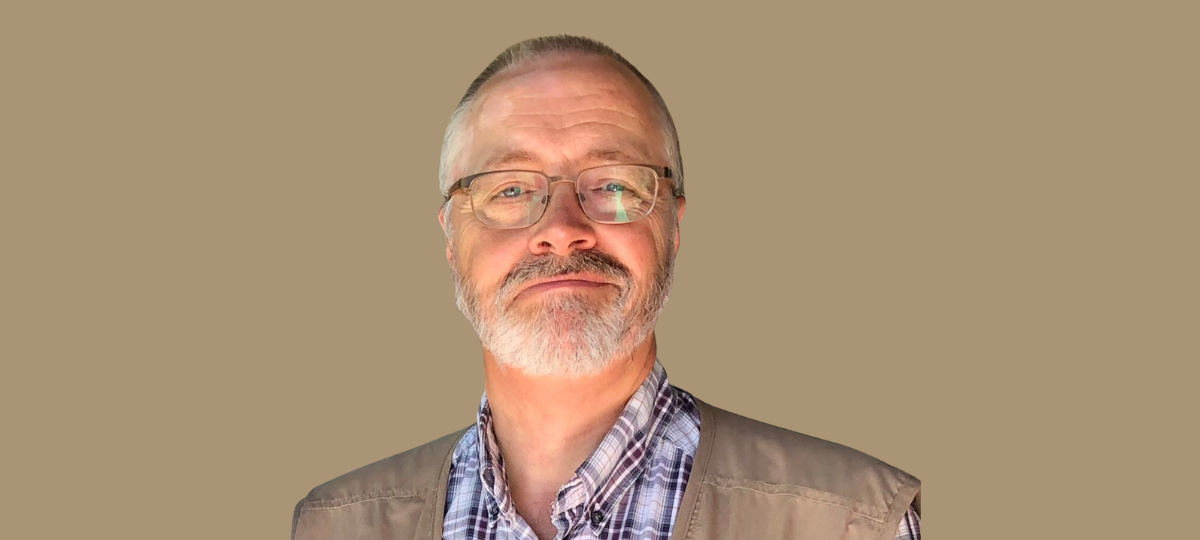Sibelius and Barnett
Andrew Barnett is a familiar figure to regulars at the Lahti Sibelius Festival. His name has appeared in programme books throughout most of the festival’s history, and he listens to every concert at the festival. Sibelius has played a central role in Barnett’s life since his youth.
‘I think it all started in the school orchestra, where – as a violinist – I got to play some of Sibelius’s shorter pieces’, says Andrew Barnett of his introduction to Sibelius. ‘I was introduced to the Second Symphony while playing in a youth orchestra.’ Barnett, then 14, found the music difficult at first, until the piece suddenly opened up. ‘It was a kind of “light bulb moment”. I realised how good the music was.’ This realisation led to active listening to Sibelius’s music and collecting recordings. Neither of these activities has abated with time.
Born in London, but spending his childhood and youth in Chelmsford, north-east of London, Andrew Barnett studied German at Oxford University. Sibelius, however, accompanied him. ‘I can’t say with certainty when I began to study Sibelius seriously. Probably during or immediately after university.’
In 1983, Barnett’s interest in Sibelius brought him to Finland for his first visit. A longer stay followed the very next year, when he got a job as an English teacher in Tampere. Around the same time, the Swedish record company BIS was becoming an internationally significant producer of Sibelius recordings. Barnett contacted them, and soon the opportunity to work full-time with music, and Sibelius in particular, presented itself. After two years in Tampere, Barnett settled in Sweden for four years as BIS’s Sibelius specialist.
Andrew Barnett’s close collaboration with the Lahti Symphony Orchestra and the Sibelius Festival began in the 1990s. Osmo Vänskä’s tenure as principal conductor laid the foundations for the ongoing and multi-award-winning collaboration between the Lahti Symphony Orchestra and BIS. ‘In 1996 I also started to attend recording sessions. It was not long after that that Tuomas Kinberg, the orchestra’s general manager at the time, started to think about establishing a Sibelius Festival.’ Andrew Barnett was unable to attend the first Sibelius Festival 2000, but since then he has only been kept away by the Covid-19 pandemic.
Over the years, lovers of Sibelius’s music have gained a wealth of well-researched information about Sibelius and his music from the descriptions of his works written by Andrew Barnett, both in CD booklets and in the programme books of the Sibelius Festival. In 2007, Yale University Press published his remarkable biography of Sibelius, which showcases Barnett’s ability to write in a clear and accessible way for any music lover. Barnett’s scholarly approach is also characterised by his sceptical attitude towards the many myths and assumptions associated with the composer, such as the belief that Sibelius did not write chamber music of any quality. Andrew Barnett likes facts.
Barnett is happy to dispel the myth about Sibelius’s chamber music. ‘The fact that Sibelius’s chamber music has not been appreciated is partly the composer’s own fault’, Barnett says. ‘Much of the chamber music is from early in his career. Many people simply assumed that the pieces were bad or unimportant, even though they had never heard or played them. This negative attitude has persisted. Unlike with his larger works, Sibelius himself did not draw attention to them.’ At the Lahti Festival, Sibelius’s chamber works have always had their place. ‘In addition to Voces intimae, the programme has included the ‘Hafträsk’ and ‘Korpo’ Trios. The String Quartet in B flat major is on the programme for the first time this year.’ With the recent publication of scores and parts for Sibelius’s chamber music, these rarely performed works should now find their way more easily into the repertoire.
Andrew Barnett continues to work with the BIS label, but now as a freelancer based in his native England. He promotes awareness of Sibelius, and thus of Finland, through Sibelius One, an organization he and his colleagues founded in 2014. ‘There have been Sibelius societies in the UK since the 1930s. The first of these was the His Master’s Voice label, which was set up to promote the sale of recordings.’ Now it was time to create a new kind of society to promote, enhance, develop and maintain an appreciation of the life and work of Jean Sibelius. The society has a worldwide membership, mainly in the UK, but with a significant presence in the USA and Australia. The Society makes an annual members’ trip to Lahti for the Sibelius Festival, which includes concerts and a visit to Ainola. Sibelius One also publishes research and other material, both online and in print.
The fascination with Jean Sibelius that he developed at a young age fills Andrew Barnett’s life. His activity as a researcher shows no sign of waning, quite the contrary. He has lectured regularly on Sibelius and was a member of the organising committee of the Fifth International Jean Sibelius Conference in Oxford in 2010. At that event he was presented with the Sibelius Medal.
Sibelius is his work and his hobby, punctuated by thought-provoking walks. ‘I am very familiar with the definition of an expert as someone who learns more and more about smaller and smaller elements of his chosen topic until eventually he knows everything about nothing’, laughs Andrew Barnett. In September, he will be back in Lahti to enjoy Sibelius’s company.
Hannele Eklund

